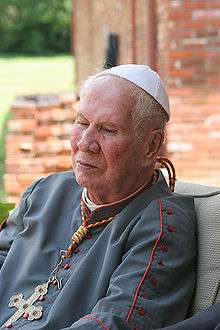Worldwide Communion of Catholic Apostolic Churches
| Abbreviation | WCCAC |
|---|---|
| Formation | 17 August 2008 |
| Founder | Luis Fernando Castillo Méndez |
| Founded at | San Lucas Sacatepéquez, Guatemala |
| Type | Union of Independent Catholic Churches |
| Headquarters | United States |
Membership | 4,000,000 |
President | Abp.John Parnell |

The Worldwide Communion of Catholic Apostolic Churches (WCCAC) – Spanish: Comunión de Iglesias Católicas Apostólicas Mundiales (CICAM) is an association of several independent Catholic Churches, founded in Guatemala in 2008.[1] The Communion is estimated to have a worldwide population of around four million members.[2]
Beliefs
Catholic faith in general
The WCCAC defines Catholic faith as that as expressed in Bible, along with the professions in the Nicene and Athanasian Creeds and results of in the first seven Ecumenical Councils.[1] It also believes that all other beliefs and practices that are not contrary to Catholic faith can be accepted by local churches and by the faithful.[3]
Church structure
Local Churches are defined as followers organized to observe liturgy and sacraments and are grouped into Ecclesiastical Bodies. All the local churches are recognized as equal.
A bishop presides over the local church with the participation of the presbytery. The bishop is in communion with other local churches.[4]
Sacraments
The WCCAC administers the sacraments of Baptism, Confirmation, the Holy Eucharist, Reconciliation, Marriage, Holy Orders and of Extreme Unction (Last Rites). Each Ecclesiastical Province determines its own ritual for the celebration of the sacraments in accordance with the situation and local cultural context.[5]
- Eucharist – The WCCAC believes in the transubstantiation of the bread and wine during the sacrament.[6]
- Ordination – There are three levels of clergy in the WCCAC: deacon, priest, bishop. Only men can be ordained.[7]
- Marriage – The WCCAC sees marriage as a sacred bond between a man and a woman. Similarly to Orthodox Catholic Church, the WCCAC believes the Sacrament of Marriage is administered by the Priest and not the couple. The WCCAC allows for dissolution of marriage by a bishop.[8]
Organization
The WCCAC is governed by the International Bishops Council. For organizational purposes, the Communion has a Board of Directors, an Honorary Advisory Committee, and an Executive Secretariat. The International Bishops Council meets every two years.
The council of the communion formed at San Lucas Sacatepequez, Guatemala on August 12–18, 2008.
Ecclesiastical bodies are formed by several local Churches in different nations and are presided over by a bishop. The WCCAC member bodies are:
- Argentina: Iglesia Católica Apostólica Argentina
- Australia: Catholic Apostolic Church of Australia
- Brazil: Igreja Católica Apostólica Brasileira
- Egypt: The Holys Synod of St. Athanasious for the Christian in the Middle East and USA
- France: Église Catholique, Apostolique et Française|Église Catholique Apostolique du France - Archbishop Pierre Pascal
- Guatemala: Iglesia Católica Ecuménica Renovada en Guatemala
- Mexico: Iglesia Católica Apostólica Mexicana
- México: Provincia Eclesial Santa María de Guadalupe
- Spain: Iglesia Católica Apostólica - Diócesis de Tarsis
- Venezuela: Iglesia Católica Apostólica Venezolana
- Trinidad and Tobago: The Holy Orthodox and Catholic Church of Trinidad and Tobago - The National Church of Trinidad and Tobago
- Germany: National Catholic Church - Narodowy Kościół Katolicki
References
- 1 2 "Fundación de CICAM". icergua.org. August 2008. Archived from the original on 2015-10-11. Retrieved 2015-10-21.
- ↑ http://cmacc1.tripod.com/stpetersoldcatholicchurch/id4.html
- ↑ Worldwide Communion of Catholic Apostolic Churches (WCCAC) constitution, Article 2
- ↑ WCCAC Const. Art.3
- ↑ WCCAC Const. Art. 4
- ↑ WCCAC Const. Art. 5
- ↑ WCCAC Const. Art. 6
- ↑ WCCAC Const. Art. 8